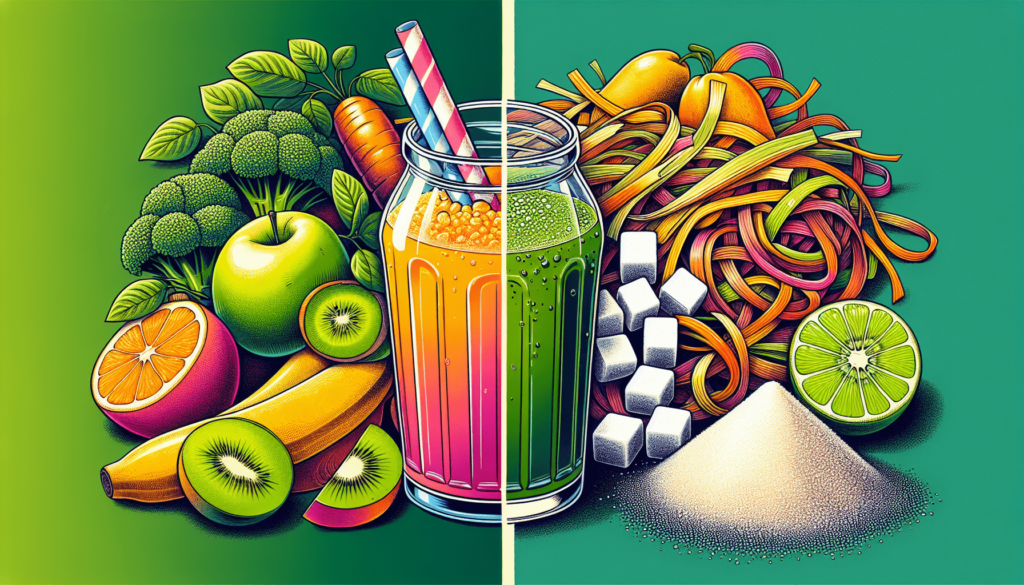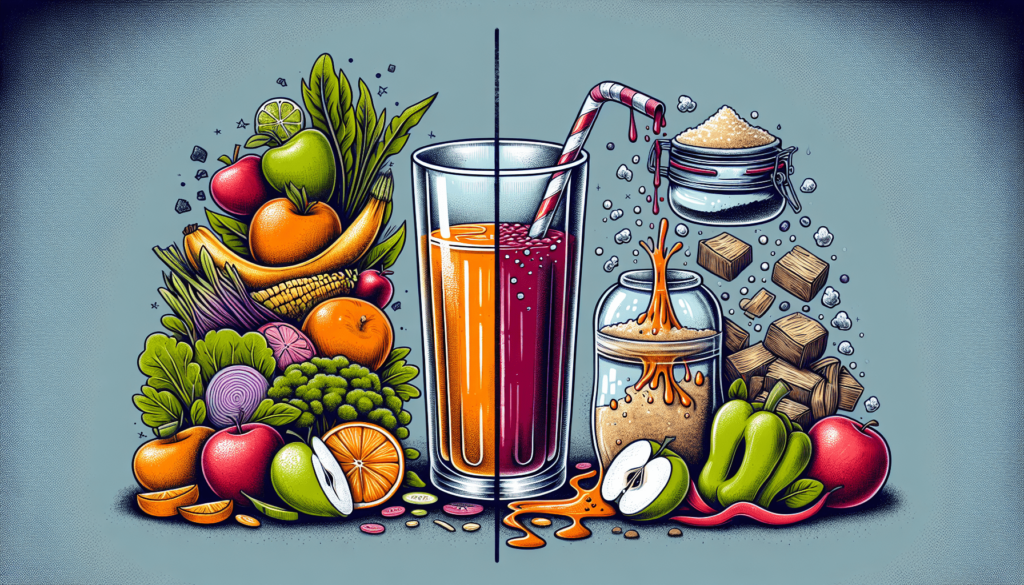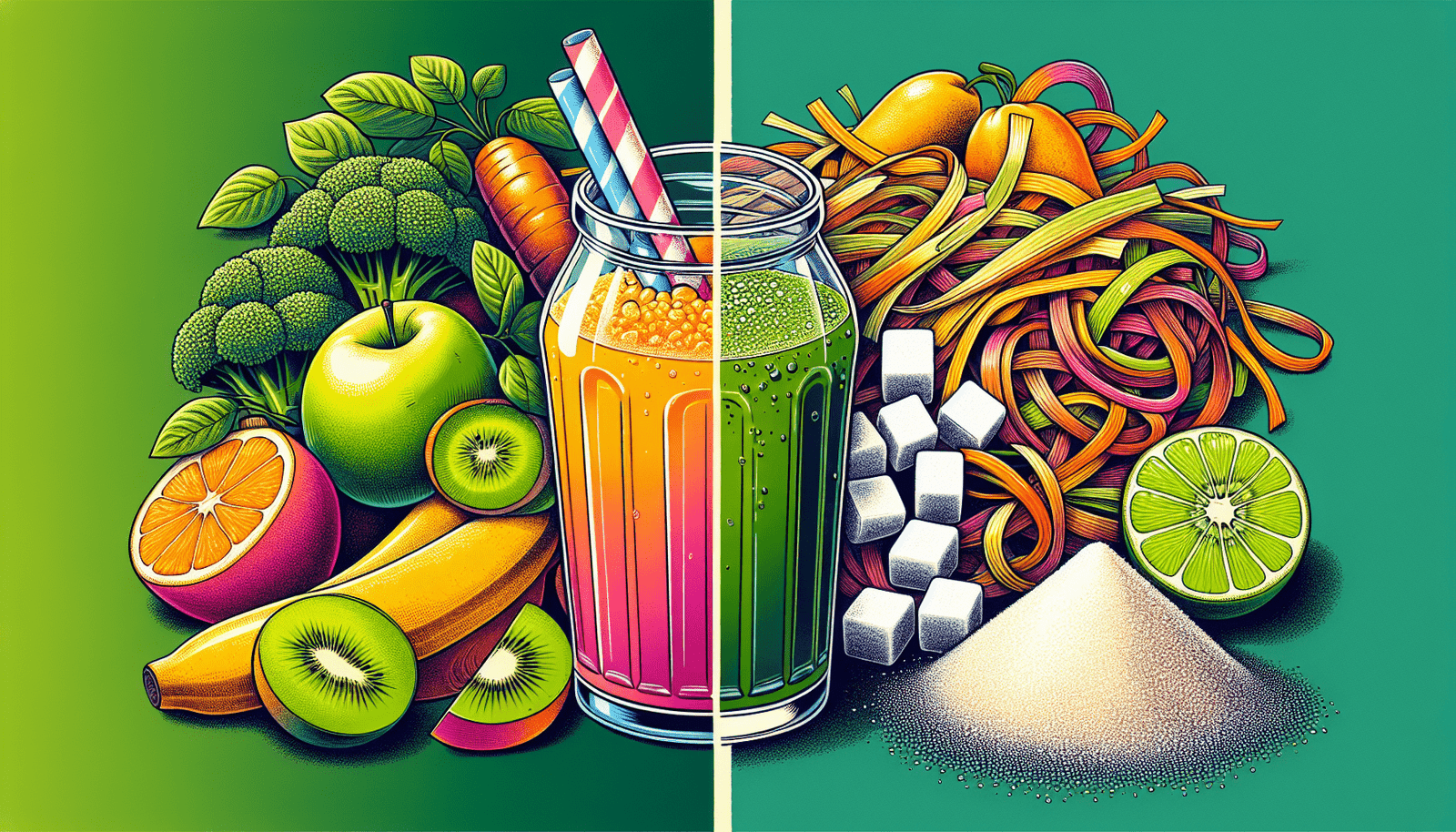Are you considering incorporating juicing into your daily routine? In this article, we will explore the pros and cons of juicing for health. Whether you are looking to boost your immune system, improve digestion, or simply add more fruits and vegetables to your diet, juicing can be a convenient and tasty way to achieve your health goals. However, it is important to weigh the benefits against the potential drawbacks to make an informed decision. Let’s take a closer look at the pros and cons of juicing for health.
Nutritional Benefits
Increased consumption of fruits and vegetables
Juicing is a fantastic way to increase your daily intake of fruits and vegetables. By juicing, you can easily incorporate a variety of nutritious produce into your diet. This is especially beneficial for individuals who struggle to meet their recommended intake of fruits and vegetables through traditional means, such as eating them whole or in salads. Juicing allows you to consume a larger volume of nutrient-rich foods in a convenient and enjoyable way.
Absorption of nutrients
When fruits and vegetables are juiced, their nutrients become more easily absorbed by your body. This is because the juicing process breaks down the fibrous structure of the produce, allowing your digestive system to quickly extract the valuable vitamins, minerals, and antioxidants they contain. As a result, your body can efficiently utilize these nutrients to support its various functions, including energy production, immune function, and cellular repair.
Boosting immune system
One of the key nutritional benefits of juicing is its ability to boost your immune system. Fruits and vegetables are loaded with essential vitamins, minerals, and antioxidants that play a crucial role in supporting immune function. By regularly consuming freshly juiced fruits and vegetables, you provide your body with an abundance of immune-boosting nutrients. These nutrients help strengthen your immune system, making it more resilient to infections and diseases.
Detoxification and Cleansing
Removing toxins from the body
Juicing is often associated with detoxification and cleansing. When you consume fresh juices, your body receives a concentrated dose of antioxidants and phytonutrients that help neutralize and eliminate toxins from your system. Fruits and vegetables, such as celery, cucumber, and parsley, have natural diuretic and detoxifying properties, which can support the detoxification process. Regular juicing can help remove accumulated toxins, promoting overall wellness and vitality.
Improved digestion
Another benefit of juicing is its positive impact on digestion. Juices are packed with enzymes that aid in the breakdown and absorption of nutrients. When you consume freshly juiced fruits and vegetables, these enzymes help your body better digest and absorb the nutrients, promoting optimal digestion. Additionally, the high water content of juices helps hydrate your digestive system, keeping it functioning smoothly and preventing issues like constipation.
Enhanced liver function
The liver plays a vital role in detoxification. Juicing can support the health and function of your liver by providing it with the nutrients it needs to carry out its detoxification processes effectively. Certain fruits and vegetables, such as beets and carrots, contain compounds that stimulate liver function and promote the production of enzymes that aid in detoxification. Regularly incorporating liver-supporting juices into your diet can help keep your liver healthy and functioning optimally.

Weight Loss
Reduced calorie intake
If you’re looking to shed a few pounds, incorporating juicing into your diet can be a helpful tool. Juices are low in calories, making them a great alternative to high-calorie snacks and sugary beverages. By replacing calorie-dense foods with freshly juiced fruits and vegetables, you can reduce your overall calorie intake and create a caloric deficit, which is essential for weight loss. Juicing allows you to consume a larger volume of nutrients while keeping your calorie intake in check.
Increased satiety
Juices can also help increase satiety and curb hunger cravings. When you consume a glass of fresh juice, you’re providing your body with a high concentration of vitamins, minerals, and fiber. The fiber in the juice helps slow down digestion, keeping you feeling fuller for longer. This can be particularly beneficial if you struggle with overeating or snacking between meals. By incorporating juices into your diet, you can feel satisfied and reduce the urge to reach for unhealthy snacks.
Promoting healthy eating habits
Another advantage of juicing for weight loss is that it promotes healthy eating habits. When you start incorporating more fruits and vegetables into your diet through juicing, you become more aware of the nutritional value of these foods. This can lead to a positive shift in your overall eating habits, making you more inclined to choose nutritious options and making it easier to maintain a healthy weight in the long term.
Convenience and Time-Saving
Easy preparation and clean-up
Juicing can be incredibly convenient, especially if you lead a busy lifestyle. Unlike cooking a meal that requires chopping, sautéing, and cleaning multiple dishes, juicing typically involves simple preparation and minimal clean-up. With a good juicer, you can quickly extract the juice from your chosen fruits and vegetables, and the juicer itself is easy to clean. This convenience makes juicing a time-saving option for those who want to incorporate more fruits and vegetables into their daily routine.
Portable and on-the-go option
Another perk of juicing is its portability. You can prepare your juices in advance and carry them with you wherever you go. Whether you’re headed to work, the gym, or running errands, having a freshly made juice on hand ensures that you can nourish your body with essential nutrients wherever you are. This mobility makes juicing a practical choice for individuals who are constantly on the move and may not have access to healthy food options throughout the day.

Improved Hydration
Increased water intake
Staying hydrated is essential for overall health, and juicing can help you achieve optimal hydration levels. Fruits and vegetables are naturally high in water content, and when they are juiced, this water becomes easily accessible to your body. By regularly consuming freshly juiced fruits and vegetables, you increase your water intake, helping to keep your body adequately hydrated at all times. Proper hydration is crucial for numerous bodily functions, including temperature regulation, nutrient transportation, and waste removal.
Maintain electrolyte balance
Juices made from fruits and vegetables also contain essential electrolytes, such as potassium and magnesium. These electrolytes play a crucial role in maintaining fluid balance within your body, ensuring that your cells function optimally. By juicing, you can replenish your electrolyte levels, keeping your body properly balanced and supporting the healthy functioning of your muscles, nerves, and organs.
Antioxidant Benefits
Protection against cell damage
Antioxidants are compounds found in fruits and vegetables that help protect your cells from damage caused by free radicals. Free radicals are unstable molecules that can lead to oxidative stress, inflammation, and chronic diseases. By regularly consuming freshly juiced fruits and vegetables, you provide your body with a rich source of antioxidants, which can neutralize free radicals and prevent cell damage. The powerful antioxidants in juices contribute to overall cellular health and can potentially reduce the risk of developing chronic diseases, such as heart disease and certain types of cancer.
Reduced risk of chronic diseases
In addition to protecting against cell damage, the antioxidants found in freshly juiced fruits and vegetables have been linked to a reduced risk of chronic diseases. Numerous studies have shown that diets rich in fruits and vegetables are associated with a lower incidence of conditions like heart disease, stroke, and certain types of cancer. By incorporating freshly juiced fruits and vegetables into your diet, you increase your antioxidant intake and support your body’s defense against chronic diseases.
Increased Fiber Intake
Promote healthy digestion
While juicing removes the fibrous pulp from fruits and vegetables, it’s still possible to include some fiber in your juices. Many juicers have settings that allow you to control the amount of pulp in your juice, so you can still obtain some fiber benefits. Fiber is essential for maintaining a healthy digestive system, as it helps regulate bowel movements, prevents constipation, and supports the growth of beneficial gut bacteria. By incorporating fiber-rich fruits and vegetables into your juicing routine, you can promote healthy digestion and maintain regularity.
Weight management
Fiber also plays a crucial role in weight management. High-fiber foods help you feel fuller for longer, reducing the chances of overeating or snacking on unhealthy foods. Including fiber-rich fruits and vegetables in your juices can help support a healthy weight and prevent weight gain. Additionally, fiber aids in slowing down the absorption of sugar into your bloodstream, which can help regulate blood sugar levels and reduce the risk of developing type 2 diabetes.
Variety and Taste
Enjoying a wide range of flavors
One of the most enjoyable aspects of juicing is the ability to experiment with a wide range of flavors. Fruits and vegetables come in various colors, textures, and tastes, offering a vast array of flavor profiles to explore. From the sweetness of apples and carrots to the tanginess of citrus fruits and the earthiness of leafy greens, juicing allows you to create a diverse range of delicious and refreshing juices. This variety ensures that you never get bored and encourages you to continue incorporating juicing into your daily routine.
Experimenting with different combinations
In addition to enjoying different flavors, juicing allows you to experiment with various fruit and vegetable combinations. Mixing different produce allows you to create unique flavor combinations and tailor your juices to your taste preferences. You can get creative with your ingredients, combining fruits and vegetables that complement each other in terms of flavor and nutritional benefits. This experimentation adds an element of fun and excitement to juicing, making it an enjoyable and personalized experience.
Misconceptions and Dangers
Missing out on fiber
While juicing offers numerous benefits, it’s important to note that the juicing process removes most of the fiber from fruits and vegetables. While some juicers allow for the inclusion of pulp, the majority of juicers extract the liquid portion, leaving behind the fiber-rich pulp. Fiber is an essential nutrient that supports digestive health, helps regulate blood sugar levels, and promotes satiety. If you rely solely on juices as your primary source of fruits and vegetables, you may miss out on the valuable fiber content. It’s important to maintain a balanced diet that includes whole fruits and vegetables to ensure you’re getting enough fiber in your diet.
Potential blood sugar issues
Another potential drawback of juicing is its impact on blood sugar levels. Juices made from fruits can be high in natural sugars, which can cause a rapid increase in blood sugar levels. This can be a concern for individuals with diabetes or those striving to control their blood sugar levels. To mitigate this risk, it’s advisable to focus on incorporating more vegetables into your juices, as vegetables tend to have a lower sugar content. Additionally, balancing your juice intake with sources of protein and healthy fats can help further stabilize your blood sugar levels.
Overconsumption and unbalanced diets
While juicing can be a healthy addition to your diet, it’s important to moderate your intake and ensure that it doesn’t replace whole foods entirely. Drinking excessive amounts of juice can lead to overconsumption of calories, sugars, and nutrients, potentially resulting in weight gain and nutrient imbalances. It’s crucial to strike a balance in your juicing routine, ensuring that it complements a well-rounded diet that includes a variety of whole fruits, vegetables, lean proteins, whole grains, and healthy fats.
Expense
Cost of juicing equipment
One aspect to consider when incorporating juicing into your lifestyle is the cost of equipment. Juicers can range in price, depending on their features and capabilities. Higher-end juicers tend to be more efficient and produce higher-quality juice, but they may come with a heftier price tag. It’s important to assess your budget and research different juicer options to find one that suits your needs and preferences. However, keep in mind that the investment in a good juicer can provide long-term health benefits and save you money on purchasing pre-made juices.
Higher grocery bill
Another factor to consider is the impact on your grocery bill. Fresh fruits and vegetables, especially organic options, can be more expensive than processed foods or those purchased in bulk. When juicing, your produce needs may increase significantly as you aim to consume a larger volume of fruits and vegetables. It’s important to budget accordingly and explore cost-effective options, such as buying in-season produce or purchasing in bulk from local farmers’ markets. With proper planning, you can enjoy the benefits of juicing without breaking the bank.
In conclusion, juicing for health offers a myriad of benefits, ranging from increased consumption of fruits and vegetables to improved hydration and weight loss support. The convenience and portability of juices make them a practical option for individuals with busy lifestyles, while the variety and taste allow for exciting experimentation. However, it’s important to be mindful of potential drawbacks, such as reduced fiber intake, blood sugar concerns, and the need for a balanced diet. By understanding the pros and cons, you can make an informed decision about incorporating juicing into your overall wellness routine.

